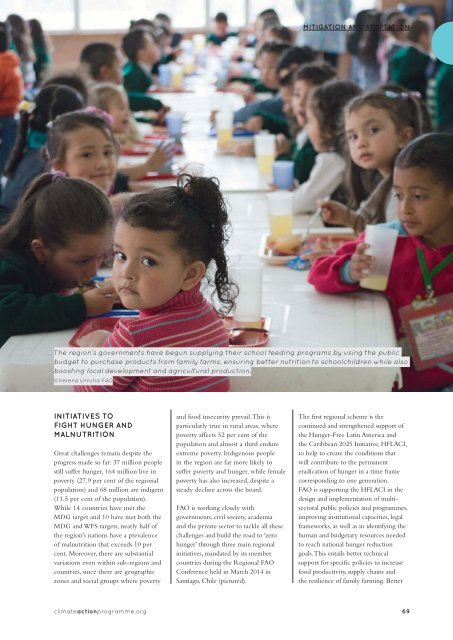Climate Action 2014-2015
Create successful ePaper yourself
Turn your PDF publications into a flip-book with our unique Google optimized e-Paper software.
MITIGATION AND ADAPTATION<br />
The region’s governments have begun supplying their school feeding programs by using the public<br />
budget to purchase products from family farms, ensuring better nutrition to schoolchildren while also<br />
boosting local development and agricultural production.<br />
©Verena Urrutia FAO<br />
INITIATIVES TO<br />
FIGHT HUNGER AND<br />
MALNUTRITION<br />
Great challenges remain despite the<br />
progress made so far: 37 million people<br />
still suffer hunger, 164 million live in<br />
poverty (27.9 per cent of the regional<br />
population) and 68 million are indigent<br />
(11.5 per cent of the population).<br />
While 14 countries have met the<br />
MDG target and 10 have met both the<br />
MDG and WFS targets, nearly half of<br />
the region’s nations have a prevalence<br />
of malnutrition that exceeds 10 per<br />
cent. Moreover, there are substantial<br />
variations even within sub-regions and<br />
countries, since there are geographic<br />
zones and social groups where poverty<br />
and food insecurity prevail. This is<br />
particularly true in rural areas, where<br />
poverty affects 52 per cent of the<br />
population and almost a third endure<br />
extreme poverty. Indigenous people<br />
in the region are far more likely to<br />
suffer poverty and hunger, while female<br />
poverty has also increased, despite a<br />
steady decline across the board.<br />
FAO is working closely with<br />
governments, civil society, academia<br />
and the private sector to tackle all these<br />
challenges and build the road to ‘zero<br />
hunger’ through three main regional<br />
initiatives, mandated by its member<br />
countries during the Regional FAO<br />
Conference held in March <strong>2014</strong> in<br />
Santiago, Chile (pictured).<br />
The first regional scheme is the<br />
continued and strengthened support of<br />
the Hunger-Free Latin America and<br />
the Caribbean 2025 Initiative, HFLACI,<br />
to help to create the conditions that<br />
will contribute to the permanent<br />
eradication of hunger in a time frame<br />
corresponding to one generation.<br />
FAO is supporting the HFLACI in the<br />
design and implementation of multisectoral<br />
public policies and programmes,<br />
improving institutional capacities, legal<br />
frameworks, as well as in identifying the<br />
human and budgetary resources needed<br />
to reach national hunger reduction<br />
goals. This entails better technical<br />
support for specific policies to increase<br />
food productivity, supply chains and<br />
the resilience of family farming. Better<br />
climateactionprogramme.org 69












